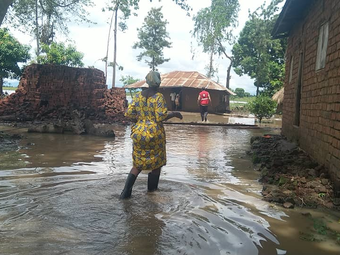Categories
Uganda
Key facts
Hazards covered by anticipation
Displacement and conflict | Drought | Epidemics | Floods
No. of people reached by anticipation (activations)
Start Network, Ebola: 316,232
Start Network, refugees: 58,072
Anticipation partners in country
Uganda Red Cross Society | WFP | National Department for Relief, Disaster Preparedness and Management | Ministry of Water and Environment | Uganda National Meteorological Authority | Ministry of Gender, Labour and Social Development | Ministry of Agriculture, Animal Industries and Fisheries | Ministry of Local Government | Ministry of Planning, Finance and Economic Development
Inform Risk Index (2022)
Hazard and exposure: 4.6
Vulnerability: 6.7
Lack of coping capacity: 7.0
Total: 6.0 (high)
Rank: 21
Photo: Uganda Red Cross Society
Country profile
Uganda is an equatorial country with a warm, tropical climate. The primary hazards that Ugandans face vary by region, but include floods (in the centre and the east, and along its major rivers), drought (especially in the north-east and centre), landslides and mudslides (along the Kenyan border in the east), epidemics, and earthquakes (along the western border).
Hundreds of thousands of people are also at risk from volcanic eruptions in the southwest, though there have been no eruptions in recent years and data on potential future eruptions is lacking. On average, 200,000 Ugandans are affected by disasters every year.
Uganda is a landlocked, low-income country, and the vast majority of people (approximately 84 per cent) live in rural areas. Approximately 20 per cent of the population lives below the poverty line. Upwards of 80 per cent are dependent on rain-fed agriculture, and the agricultural sector produces 25 per cent of Uganda’s gross domestic product.
Although food insecurity is not a chronic problem in most areas - 89 per cent of the population is considered food secure - drought and floods periodically threaten agricultural production, and hence food security. The impacts of drought are exacerbated by desertification and environmental degradation. Floods, such as those experienced in 2007, lead to fatalities and cause major damage to crops and infrastructure (such as schools).
Projects
The Innovative Approaches to Response Preparedness (IARP) project in Ethiopia, Kenya and Uganda is implemented by the National Red Cross Societies of the three countries and supported by the Netherlands Red Cross, the British Red Cross, the 510.global data team and the Red Cross Red Crescent Climate Centre. The project aims to develop anticipatory actions and institutionalized early action protocols (EAPs) for flood and drought hazards in vulnerable areas in Ethiopia, Kenya and Uganda. This is supported by capacity development in areas of data preparedness and cash and voucher assistance. The development of the EAPs is done in close collaboration with national government agencies and UN agencies to ensure the harmonization of triggers (alert thresholds), early warning messages and anticipatory actions.
Strengthening shock-sensitive systems in Karamoja
In 2020, WFP began supporting multi-sectoral anticipatory action to address the cross-cutting impacts of drought. An important innovation will be to assess the capacity of national social protection instruments as potential anticipatory actions, including unconditional cash transfers and labour-intensive public works.
Innovative approaches to response preparedness
The Uganda Red Cross Society was one of the first National Societies to pilot forecast-based financing. Building on work started in 2014, the 'Innovative approaches to response preparedness' (IARP) project began in 2018 to develop Early Action Protocols (EAPs) for floods and for drought.
Anticipation of Ebola
In 2018, the Start Network provided £165,000 in anticipatory funding to Care International and Relief International to prevent the spread of Ebola from the neighbouring Democratic Republic of the Congo. The organizations conducted a rapid 'knowledge attitude practices' assessment with refugees and provided training to local health workers, reaching over 300,000 people (alert 254).
Anticipation of refugees
In 2016, the Start Network funded Action Against Hunger, Oxfam and Save the Children in anticipation of refugees entering Uganda because of the conflict in neighbouring South Sudan. The organizations provided non-food items, and psychosocial, nutritional and WASH/hygiene support to vulnerable individuals, reaching over 58,000 people (alert 096).
Further resources
- EAP for Floods: Uganda - Annual Report 2023
- Case Study Stakeholder Engagement in Anticipatory Action in Zambia and Uganda (2021)
- FATHUM POLICY BRIEF Understanding the local context – A must for successful Forecast based Financing: The case of Amuria district, Uganda
- FATHUM Uganda Risk Profile Report


